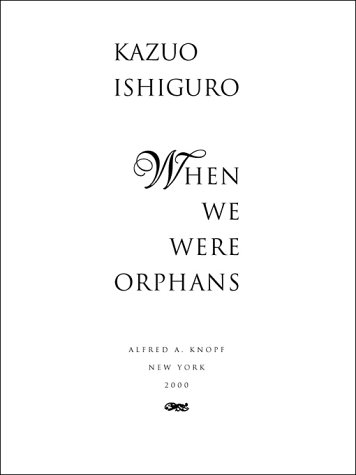
When We Were Orphans PDF
Preview When We Were Orphans
When 9-year-old Christopher Banks's father--a British businessman involved in the opium trade--disappears from the family home in Shanghai, the boy and his friend Akira play at being detectives: "Until in the end, after the chases, fist-fights and gun-battles around the warren-like alleys of the Chinese districts, whatever our variations and elaborations, our narratives would always conclude with a magnificent ceremony held in Jessfield Park, a ceremony that would see us, one after another, step out onto a specially erected stage ... to greet the vast cheering crowds."
But Christopher's mother also disappears, and he is sent to live in England, where he grows up in the years between the world wars to become, he claims, a famous detective. His family's fate continues to haunt him, however, and he sifts through his memories to try to make sense of his loss. Finally, in the late 1930s, he returns to Shanghai to solve the most important case of his life. But as Christopher pursues his investigation, the boundaries between fact and fantasy begin to evaporate. Is the Japanese soldier he meets really Akira? Are his parents really being held in a house in the Chinese district? And who is Mr. Grayson, the British official who seems to be planning an important celebration? "My first question, sir, before anything else, is if you're happy with the choice of Jessfield Park for the ceremony? We will, you see, require substantial space."
In When We Were Orphans Kazuo Ishiguro uses the conventions of crime fiction to create a moving portrait of a troubled mind, and of a man who cannot escape the long shadows cast by childhood trauma. Sherlock Holmes needed only fragments--a muddy shoe, cigarette ash on a sleeve--to make his deductions, but all Christopher has are fading recollections of long-ago events, and for him the truth is much harder to grasp. Ishiguro writes in the first person, but from the beginning there are cracks in Christopher's carefully restrained prose, suggestions that his version of the world may not be the most reliable. Faced with such a narrator, the reader is forced to become a detective too, chasing crumbs of truth through the labyrinth of Christopher's memory.
Ishiguro has never been one for verbal pyrotechnics, but the unruffled surface of this haunting novel only adds to its emotional power. When We Were Orphans is an extraordinary feat of sustained, perfectly controlled imagination, and in Christopher Banks the author has created one of his most memorable characters. --Simon Leake
From Publishers WeeklyDespite some contrived events and a tendency to rework the characterizations and themes of his previous books, Ishiguro's latest novel triumphs with the seductiveness of his prose and his ability to invigorate shadowy events with sinister implications. Like all of Ishiguro's protagonists, the narrator, here a recent Cambridge graduate named Christopher Banks, is an emotionally detached man who hides his real feelings from himself and who passively endures being trapped in nightmarish settings that give him "a grave foreboding." Like the hero of The Unconsoled, Christopher is bewildered by "the assumption shared by everyone... that it was somehow my sole responsibility to resolve the crisis." The crisis here is nothing less than averting WWII, which shares priority in Christopher's mind with the disappearance of his parents in Shanghai in the early 1900s, when he was nine years old. Christopher is sent to school in England, where he first formulates his dream of becoming a famous detective, an objective he achieves at a young age. Though he is convinced that his parents are still alive and that he can find them, he doesn't return to Shanghai until 1937, when he is in his mid 30s. It's obvious to the reader that Christopher deludes himself about many things, such as his conviction that when he "roots out evil," he is "cleansing the world of wickedness." This inclination toward grandiosity is a direct result of Christopher's sense of powerlessness as an orphan. While he is unaware of the connection, he is drawn to mercurial Sarah Hemmings, also orphaned in childhood. Ishiguro again conjures time and place with precise detail, evoking both the exotic atmosphere of prewar Shanghai, festering with the contrast between the arrogant residents of the International Settlement and the Chinese living in squalid slums and supplied with opium by foreign merchants, and class-conscious England, in which one's "connections" depend on family lineage. While the novel is mainly an introspective account of the protagonist's emotional dislocation, Ishiguro shows a new mastery of narrative tension, notably with Christopher's Kafkaesque experience during the Japanese invasion. In the end, Christopher understands that his vision of reality was distorted, and that his lifelong mission, "chasing through long years the shadows of vanished parents," was the inescapable fate of one caught in the toils of historical turbulence. 75,000 first printing. (Sept.)
Copyright 2000 Reed Business Information, Inc.
